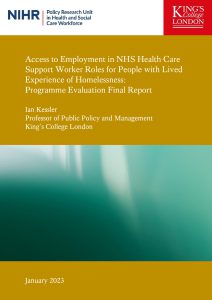Stephen Martineau, Research Fellow at the NIHR Policy Research Unit in Health and Social Care Workforce at King’s College London, reviews Deprivation of Liberty in the Shadows of the Institution by Lucy Series (University of Bristol). Page numbers in brackets refer to the book, which was published in March 2022 (and is available for free). (2,642 words)
Introduction
One of the more familiar stories from recent UK history about the lives of people with longstanding serious mental illness or intellectual or cognitive disabilities is their move from large-scale institutional accommodation to living arrangements beyond the walls of such places. The extent of this ostensible deinstitutionalization is illustrated by the decline in hospital beds for ‘mental illness’, ‘geriatric’ patients and people with intellectual/learning disabilities—from over 200,000 in 1955 to under 20,000 in 2020 (Series, 2022: p.53). Much of this shift was to do with the closing of survivals of the Victorian era (which started out being called asylums, subsequently renamed mental hospitals) that took place through the second half of the twentieth century.
As Lucy Series describes in her book, Deprivation of Liberty in the Shadows of the Institution, these newer smaller-scale living arrangements may take the form of ‘quasi-institutions’ (residential care and nursing homes) or ‘quasi-domestic’ arrangements (‘supported living’, ‘independent living’, sheltered housing), or indeed ordinary homes.
Series describes this development as a passage from a ‘carceral’ to a ‘post-carceral’ era (after Unsworth, 1991). But in making the physical move away from institutions, to what degree have some less tangible aspects of the old institutional life been carried over to those new living arrangements, as far as these individuals are concerned? To what extent, Series asks, are they still living in ‘the shadows of the institution’?
This question was brought sharply into focus in the UK Supreme Court case of Cheshire West, the litigation that forms the dramatic fulcrum of this book. The court’s approach meant that its definition of deprivation of liberty applied to a much wider array of living arrangements than had hitherto been the case, extending to private homes, where family members were the carers (or custodians?) of the person concerned. It is the socio-legal ramifications of this move (which Series views as transgressive) that are the main concern of the book. To put it briefly and in human-rights terms, in its approach to concerns about liberty in the area of social care detention—under article 5 of the European Convention on Human Rights—the court seemed to set up a clash with a set of questions belonging more under article 8 (respect for private and family life), to do with the distinction between institutions and homes.
This review is split into five short sections: 1. Social care detention. 2. The acid test. 3. Liberty. 4. Home. 5. Out of the shadows? Continue reading →





